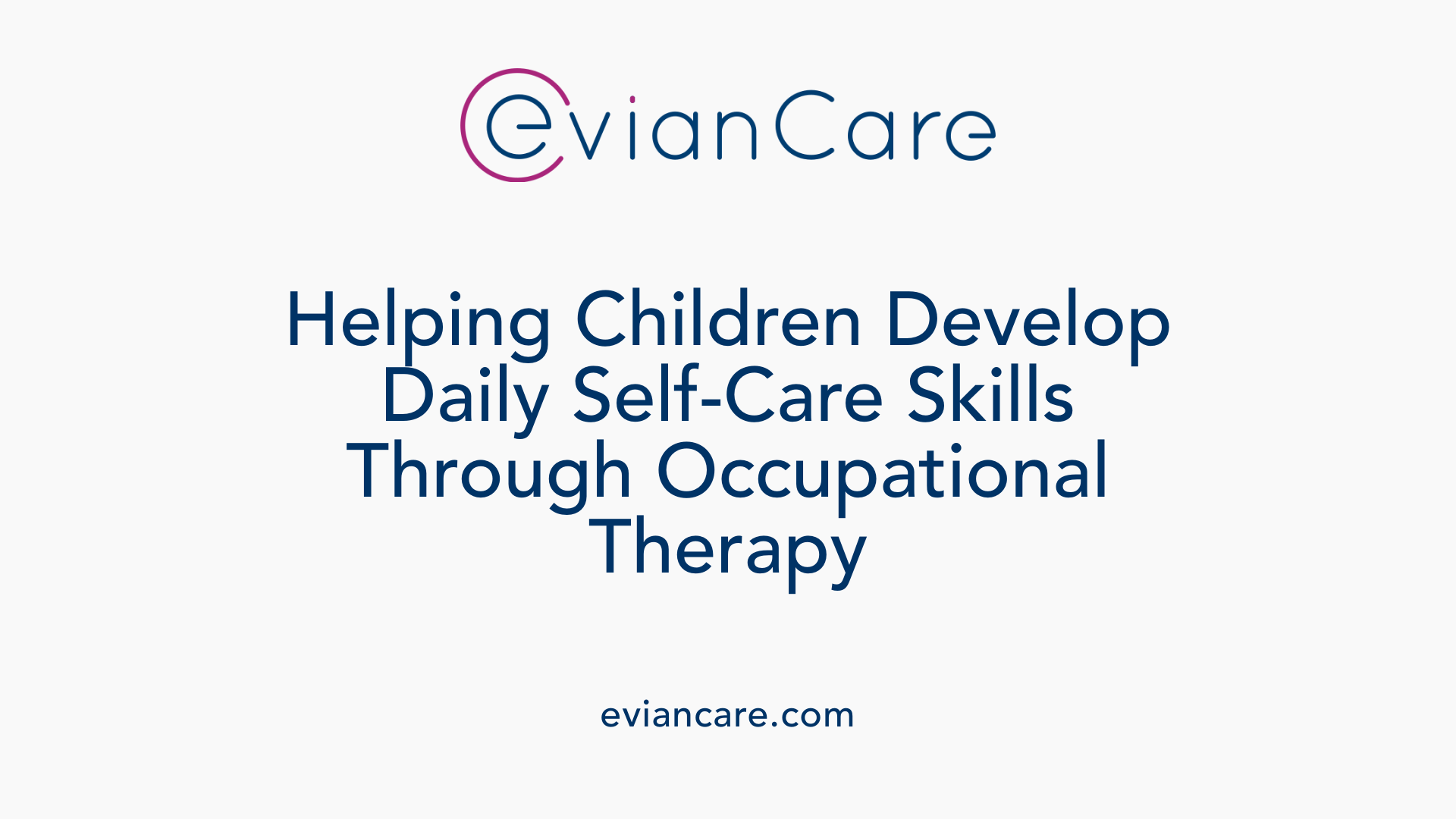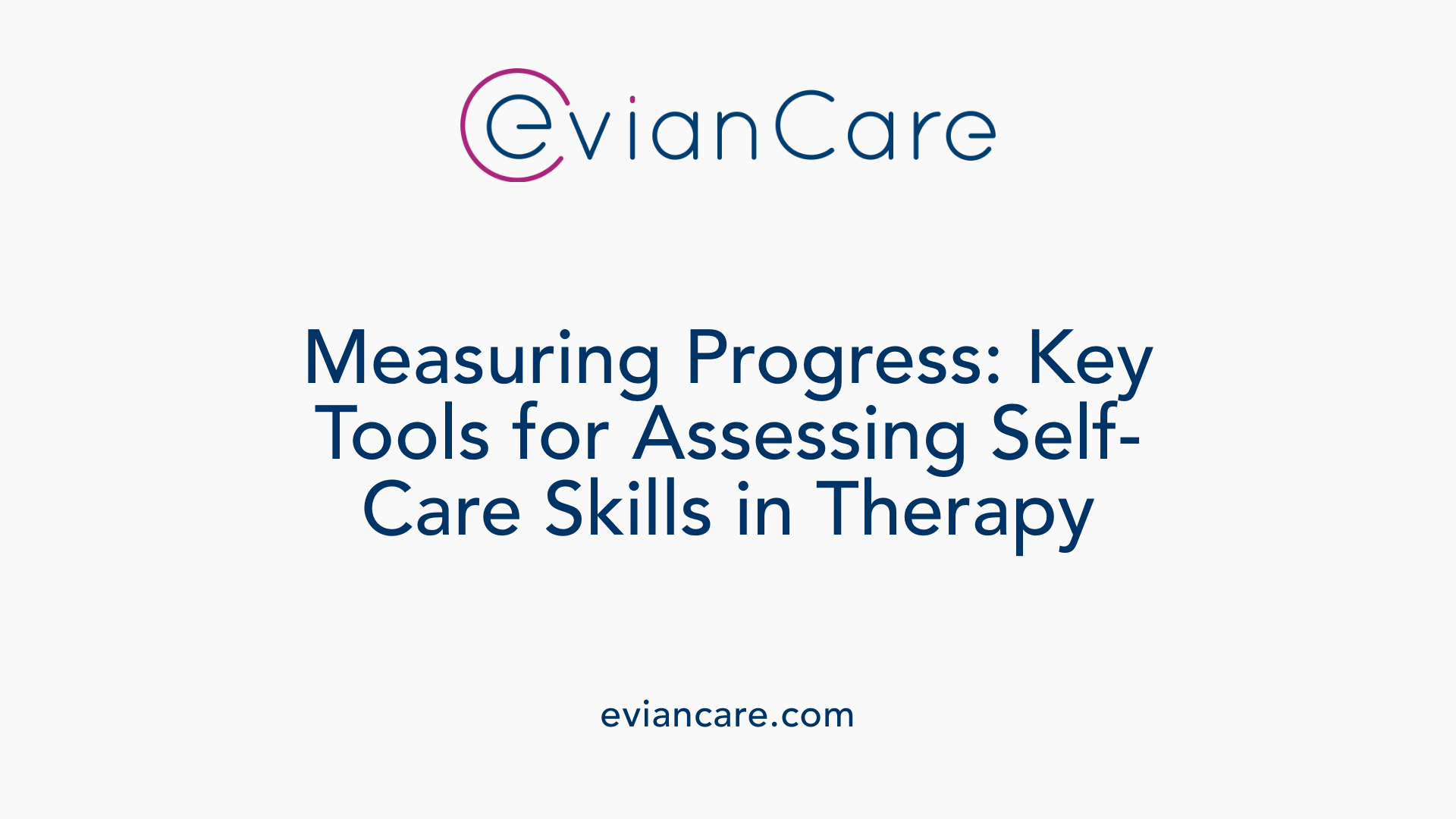
Empowering Kids with Self-Care Skills
Occupational therapy plays a crucial role in helping children develop essential self-care skills that foster independence, confidence, and social participation. From early childhood through adolescence, specialized interventions are designed to address developmental delays, sensory processing issues, and motor difficulties, ensuring children can perform daily activities like dressing, grooming, feeding, and toileting with greater autonomy. This article explores how occupational therapy promotes self-care in children, the strategies used, developmental milestones, and practical guidance for parents and caregivers.
What is Self-Care Occupational Therapy?

What is self-care occupational therapy?
Self-care occupational therapy is a specialized area within the broader field of occupational therapy that focuses on helping individuals develop and enhance their ability to perform daily activities independently. These activities, known as activities of daily living (ADLs), include essential routines such as dressing, grooming, bathing, toileting, and eating.
Occupational therapists tailor their interventions to meet each person’s unique physical, mental, emotional, and sensory needs. They assess a client’s current skills and environment and create personalized plans that may include skill training, environmental modifications, adaptive equipment, and routine development. The goal is to help individuals live more autonomous, safe, and confident lives.
This therapy is relevant for children, adults, and older adults who face challenges due to developmental delays, physical disabilities, sensory issues, or injury. Therapists often work closely with families, caregivers, teachers, and healthcare providers to ensure that interventions are effective and integrated into daily routines.
The core purpose of self-care occupational therapy is to promote participation in everyday life by improving independence, supporting safety, and fostering a sense of accomplishment. By addressing individual challenges and making necessary adaptations, this therapy empowers clients to manage their routines and improve their overall well-being.
Who benefits from self-care occupational therapy?
Children with developmental delays, sensory processing challenges, or motor impairments are among the primary beneficiaries of self-care OT. These children may struggle with dressing, toileting, grooming, or feeding, which can impact their social participation and confidence.
Older adults or individuals recovering from injury or illness also benefit, as therapy helps regain lost skills or adapt to new challenges. Children with conditions like autism spectrum disorder, cerebral palsy, Down syndrome, or sensory processing disorder often require tailored interventions to improve self-care skills.
Caregivers and families gain valuable support through education and strategies that help children practice and master daily routines independently. Schools and community programs may also enlist occupational therapists to foster inclusive participation.
What are the goals of therapy?
The main goals of self-care occupational therapy include:
- Developing independence in daily routines like dressing, grooming, and toileting.
- Improving fine motor skills needed for tasks such as buttoning shirts or using utensils.
- Enhancing gross motor skills to support mobility and participation in activities like walking or jumping.
- Addressing sensory processing issues to increase tolerance for grooming or dressing.
- Creating or modifying routines, visual schedules, and environmental setups to support task completion.
- Promoting confidence, emotional regulation, and social participation.
Effective therapy often combines skill development with supportive routines, environmental adaptations, and caregiver involvement. These strategies not only help children handle daily activities better but also contribute positively to their overall growth and social integration.
How Does Occupational Therapy Help Children Learn Self-Care Activities?

How does occupational therapy help children learn self-care activities?
Occupational therapy (OT) is instrumental in guiding children to develop essential self-care skills such as dressing, grooming, feeding, and toileting. Therapists tailor interventions to meet each child's unique needs by creating personalized strategies that focus on building independence. They use step-by-step task analysis, breaking down complex activities into manageable parts to make learning easier.
A core component of therapy involves incorporating adaptive equipment, which can assist children with physical or sensory challenges. For example, button hooks facilitate dressing, weighted utensils assist with feeding, and shoe horns simplify wearing shoes. These tools help children perform tasks more independently and with less frustration.
Sensory processing difficulties often impact a child's ability to complete self-care routines comfortably. Therapists incorporate sensory integration techniques to improve tolerance and response to tactile, visual, or proprioceptive stimuli. This can include activities that calm or alert the child's sensory systems, making self-care tasks more manageable.
The involvement of families and caregivers is crucial in therapy. Therapists work closely with them to ensure that strategies are reinforced consistently at home, in school, and within the community. Creating routines and visual schedules supports children in remembering and performing tasks independently.
Overall, occupational therapy promotes autonomous self-care habits by strengthening motor skills, enhancing sensory regulation, and fostering problem-solving abilities. The collaborative effort among therapists, families, and educators ensures that children develop confidence and independence in their daily routines, positively impacting their social participation and emotional well-being.
Supporting and Promoting Self-Care Development at Home and School
 Establishing routines and visual supports plays a significant role in helping children develop self-care skills. Consistent daily schedules, chore charts, and visual cues like picture schedules or step-by-step diagrams can help children understand and remember their self-care tasks. These tools create predictability, reduce anxiety, and promote independence by guiding children through activities such as brushing teeth, dressing, or cleaning up after play.
Establishing routines and visual supports plays a significant role in helping children develop self-care skills. Consistent daily schedules, chore charts, and visual cues like picture schedules or step-by-step diagrams can help children understand and remember their self-care tasks. These tools create predictability, reduce anxiety, and promote independence by guiding children through activities such as brushing teeth, dressing, or cleaning up after play.
Parental involvement and education are essential in nurturing a child's self-care abilities. Parents and caregivers can support growth by teaching age-appropriate tasks, like hygiene routines for toddlers or meal preparation for older children. Engaging children in activities that foster self-awareness and emotional regulation, such as mindfulness exercises and creating calm spaces, encourages self-monitoring.
Modeling healthy habits is another crucial strategy. When adults demonstrate stress management, acknowledge their own needs, and participate in self-care routines openly, children learn by imitation. Regular conversations about feelings, physical needs, and ways to handle emotions help children recognize and articulate their needs, building confidence and independence.
To maintain progress, consistency and motivation are key. Reinforcing routines with positive reinforcement, reward charts, and small privileges encourages children to participate willingly. Celebrating successes, even small ones, boosts motivation and helps children associate self-care activities with positive feelings.
Involving children in planning and decision-making about their routines fosters ownership and motivation to practice self-care. Collaborating with teachers, therapists, and other caregivers also ensures that strategies are reinforced across home and school environments.
Combining these approaches creates a supportive framework that promotes the development of essential self-care skills, laying a foundation for greater independence and social participation.
Assessment Tools for Measuring Self-Care Skills
 In occupational therapy, various assessment tools are used to measure a child's self-care skills, providing valuable insights into their independence and safety in daily routines.
In occupational therapy, various assessment tools are used to measure a child's self-care skills, providing valuable insights into their independence and safety in daily routines.
One widely utilized instrument is the Performance Assessment of Self-care Skills (PASS). This observational tool focuses on evaluating how children perform activities of daily living (ADLs) and community tasks. Therapists observe children completing 26 core tasks, which are grouped into domains such as functional mobility, basic ADLs like dressing and grooming, and instrumental ADLs such as meal preparation or managing personal hygiene. The PASS assesses both physical and cognitive aspects, rating the child's level of assistance needed and safety during each task.
Alongside PASS, simpler tools like the Barthel Index are used to measure basic ADL capabilities, particularly in children with significant physical disabilities. The Katz Index is another tool that gauges dependence or independence in common daily activities, helping therapists identify specific areas needing support.
The Canadian Occupational Performance Measure (COPM) offers a different approach by involving children and their caregivers in identifying individual goals related to self-care. Clients rate their performance and satisfaction levels, enabling therapists to tailor interventions effectively.
These assessments guide therapy goals by pinpointing particular challenges a child faces in self-care routines. They inform personalized strategies, whether that involves skills training, environmental modifications, or adaptive equipment.
Furthermore, observing and rating skills during assessments help capture real-life performance rather than just testing knowledge, which is crucial in designing effective, functional treatment plans. Regular reassessment ensures progress tracking and adjustment of therapeutic approaches to maximize independence in self-care activities.
Developmental Milestones and How Therapy Can Help Achieve Them
What are typical developmental milestones for self-care skills, and how can therapy help children achieve them?
Children usually develop self-care skills gradually as they grow. By age 2 to 3, many children begin to feed themselves using utensils, remove some clothing, and start to use the toilet with supervision. Around ages 4 to 6, most children can dress themselves independently, brush their teeth, and wash their hands and face without assistance. Achieving bladder and bowel control typically occurs between ages 4 and 5, marking full toileting independence.
These milestones are essential for fostering confidence, independence, and social participation. However, each child progresses at their own pace, and variations are common. Some children might struggle with motor coordination, sensory sensitivities, or understanding routines, leading to delays.
Occupational therapists play a vital role in helping children overcome these challenges. They use tailored interventions that focus on improving fine motor skills — like grasping and manipulating objects — and coordination. Sensory integration techniques help children tolerate activities like grooming or dressing, while task modification and visual supports make self-care routines easier to understand and perform.
Early identification of delays enables timely intervention, which can significantly boost a child's ability to independently manage daily activities. Through play-based therapy, skill-building exercises, and involving family routines, occupational therapists support children in reaching developmental milestones more confidently and comfortably.
By working closely with caregivers and educators, therapy strategies are customized to each child's needs, ensuring sustainable progress. Overall, targeted pediatric occupational therapy can help children develop essential self-care skills that set a foundation for lifelong independence.
Strategies and Techniques Used by Occupational Therapists
Occupational therapists utilize a variety of effective methods to support children in developing self-care and independence skills. One fundamental approach involves task modification, where therapists adapt activities by recommending tools such as button hooks, weighted utensils, shoe horns, or visual schedules. These modifications help children perform tasks with greater ease and confidence.
Sensory integration therapy is another key strategy. It addresses sensory processing challenges that can hinder activities like dressing or grooming. By providing controlled sensory experiences, therapists help children improve their tolerance to touch, proprioception, and other stimuli, making self-care routines less overwhelming.
Creating routines and using visual cues are critical for helping children remember and execute daily tasks. Visual schedules and timers serve as prompts, supporting organization and sequencing of activities, which is especially beneficial for children with attention or executive functioning difficulties.
Development of motor skills is central to self-care success. Therapists focus on enhancing both fine and gross motor abilities through playful exercises. These might include activities that improve hand strength, coordination, and motor planning, such as buttoning shirts, tying shoelaces, or maintaining balance during dressing.
In addition to motor development, strengthening cognitive and executive skills plays a vital role. Therapists work on attention, task initiation, problem-solving, and sequencing skills, often through engaging, play-based methods. Environmental modifications—like arranging accessible clothing or hygiene supplies—are also employed to support independence.
Through a combination of sensory activities, motor exercises, routine-building, and environmental adjustments, occupational therapy helps children develop the confidence and skills needed for self-care. Caregiver education further reinforces these strategies at home, ensuring consistency and promoting long-term independence.
Addressing Developmental Delays and Building Confidence for Independence
How does occupational therapy address developmental delays that affect self-care skills?
Occupational therapy plays a vital role in helping children overcome developmental delays that hinder self-care activities such as dressing, grooming, feeding, and toileting. Therapists develop tailored, play-based programs that focus on improving motor skills, sensory processing, cognitive abilities, and emotional regulation.
Using fun and engaging activities, therapists guide children through breaking down complex self-care tasks into smaller, manageable steps. Repetition and positive reinforcement help children gain confidence and mastery over these activities.
Sensory integration techniques are often incorporated to help children better respond to tactile, visual, and vestibular stimuli, reducing adverse reactions during routines like haircutting or dressing. Fine motor activities—such as manipulating clothing fasteners or using utensils—are emphasized to boost coordination and dexterity.
Environmental modifications, like adaptive tools and routines, further support independence. For example, button hooks or weighted utensils can make tasks easier and more accessible.
Family involvement is critical. Therapists educate caregivers on reinforcing skills at home, structuring daily routines, and creating consistent environments that foster growth.
Overall, occupational therapy aims to enhance underlying skills, promote confidence, and help children participate more fully in daily living activities, all tailored to their individual developmental levels and needs.
Fostering Independence Through Collaborative Care
Occupational therapy serves as a vital resource for children facing challenges in developing self-care skills. By implementing personalized, play-based strategies and involving families and caregivers, therapists can help children reach critical developmental milestones and gain confidence in their abilities. Through environmental modifications, routine development, sensory support, and motor skill enhancement, occupational therapists empower children to participate actively and independently in daily life. Early intervention is key, ensuring children develop the essential skills necessary for a healthy, confident, and integrated life in their communities and beyond.
References
- How Can Occupational Therapy Help Your Child Develop Self Care ...
- Top 10 Ways Occupational Therapy Can Help Children with Self-Care
- A Scoping Review of Intervention Implementation for Self-Care Skills ...
- Promoting Self-Care Skills: Dressing, Feeding, And Beyond
- The Role of Occupational Therapy in Child Development - More to Say
- Self-Care Skills - Butterfly Paediatric Therapy Inc.
- Self-Care Skills Therapy | Bozeman, MT | Root Pediatrics












